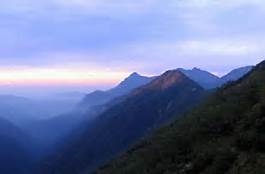
"When you come into the land that I give to you, the land will rest a Shabbat for the Divine..."
The Torah reading Parshat Behar opens by talking about Shabbat not as a day of rest for people, but as a rest for the land. It says:
Ki tavo’u el ha’aretz asher ani notein lakhem, v’shavta ha’aretz Shabbat laShem- When you come into the land that I give to you, the land will rest a Shabbat for the Divine. It then goes on to explain what it means for the land to rest: "Sheish shanim tizra sadekha v’sheish shanim tizmor karmekha v’asafta t’vuatah- "Six years your will plant your field, prune your vineyard and gather in your produce. "Uvashana hashvi’it Shabbat shabbaton yiyeh la’aretz- But the seventh year should be a Sabbath of Sabbaths for the land… don’t plant your field or prune your vineyard..." Now the Torah doesn’t talk much about vegetables. When it refers to planting fields, it’s mostly talking about grain, and from the grain is made the ancient staple, bread. Pruning vineyards is a reference of course to grapes that are made into wine. Now wine and bread are not only basic foods, they’re also sacramental foods- forming the ritual part of sacred meals on Shabbat and festivals. In fact, the first mention of this is in Bereishit 14:18 when Makitzedek, the priest-king of Shalem, blesses Avraham and brings him bread and wine. I heard once from a friend a special teaching that he heard from Rabbi Shlomo Carlbach of blessed memory. He pointed out that wine is something that gets better and better with age. You pay more for wine depending on how old it is. Bread, on the other hand, has to be fresh. No one wants a fifty year-old loaf of bread. Similarly, there’s an aspect of the spiritual path that’s ancient and an aspect that’s fresh and new. For example, the Torah, and really the whole Jewish tradition, is ancient and there’s a special richness in that. And even though there are plenty of passages in the Torah that may seem wrong and even disturbing, that’s offset in a sense by the richness of being connected to a lineage that’s many thousands of years old. And yet, that richness doesn’t really come to life unless it’s combined with fresh, new insights and interpretations. No one wants to hear the same old canonized interpretations over and over again. For the tradition to really live, it also has to be like bread- we need khidushim- new insights. On a deeper level, the very practice of Presence also contains these two aspects. On one hand, there is nothing more ancient than the present moment. There’s nothing that’s ever existed that didn’t exist in the space of its own present. That’s why one of the names of God is Atik Yomin- the Ancient of Days. And when you become fully present to the ancient space of this moment, there’s an intoxication, as you drink in the wine of the Being. At the same time, in becoming present to That which is most ancient, there’s also a spontaneous letting go of mental and emotional baggage from the past so that everything in your experience becomes alive and new like a freshly baked challah. So on this Shabbat B’Har and B’khukotai- the Sabbath of the Mountain and the Decree- may continue to ascend the mountain of transcendence and freedom through both the wine of tradition and the bread of immediacy, bringing that transcendence into the flow of actual life, doing our part to fulfill the decree of tikum olam- transforming this world into a celebration of creation and an expression of love. Good Shabbos!!
0 Comments
Leave a Reply. |
Archives
July 2024
|
 RSS Feed
RSS Feed